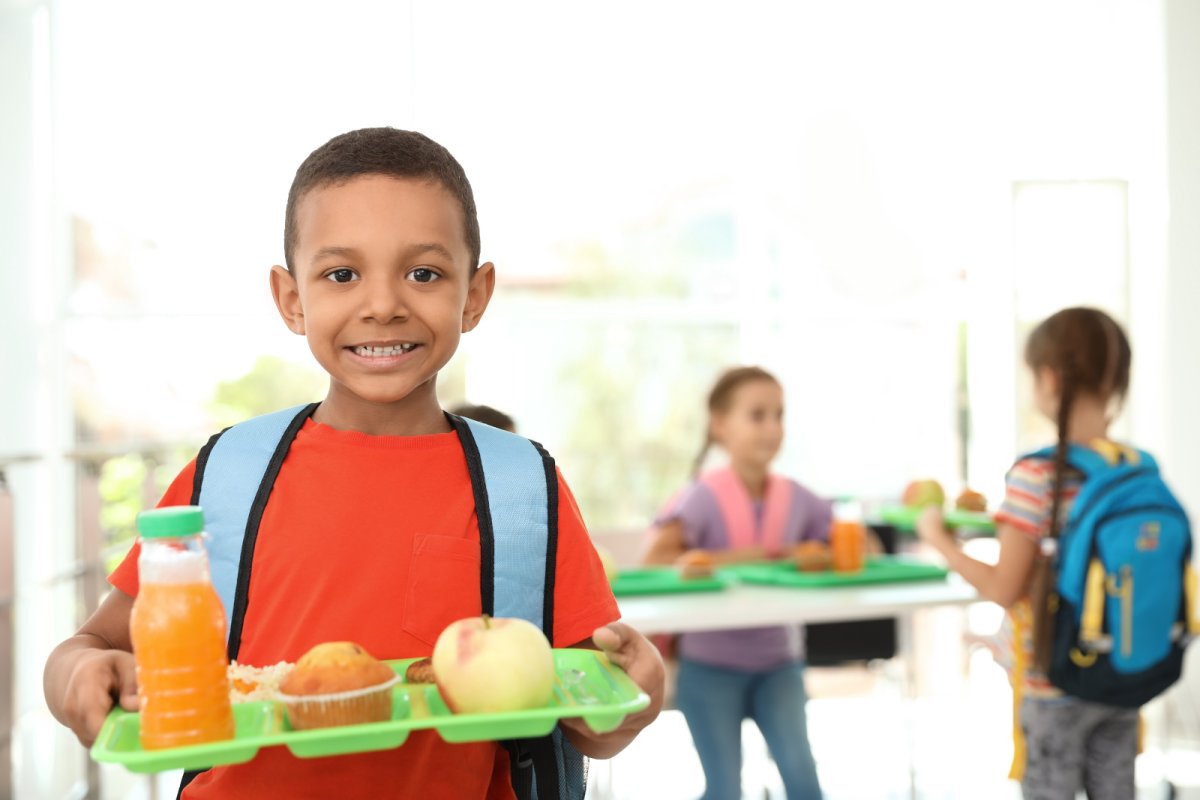 Young boy with school lunch. Copyright: New Africa | shutterstock
Young boy with school lunch. Copyright: New Africa | shutterstock
Trailblazers in children's food: five areas ensuring school food for all
Local councils are taking innovative steps to expand provision and campaign for expansion of free school meals to all children, as Hull, West Midlands, Cardiff, the Greater London Authority and Southwark Council shared ther stories and insights.
Across the UK, councils, food partnerships, authorities and organisations are taking innovative steps to ensure every child has access to free and nutritious school meals. The Children's Food Campaign and Sustainable Food Places held a webinar in October 2023 featuring speakers from the Hull Food Partnership, the Food Foundation, the Local Authority Caterers Association, Greater London Authority and Southwark Council. These five case studies provide invaluable lessons into the benefits and challenges in delivering free school meals for all children in the UK.
Missed the webinar? Watch it here.
Hull
In 2023, Hull Food Partnership undertook a campaign to improve school meals provision across the city, including increasing uptake and exploring the building blocks needed to expand provision in the future to benefit more children. 20 years ago, Hull famously rolled out universal free school meals and was "the envy of local authorities up and down the country" with research into Hull's provision showing manifold positive impacts on the city's children. It was later scrapped on the grounds of cost. Darren Squires, the partnership's Community Campaign Officer, has been working with Hessle Road Network, a voluntary Youth Centre in Hull, to produce a social media campaign centred on youth food justice, including free school meals. Darren facilitated a group of 10-12 year olds to create a slogan, copy, graphics, layout and short animated video for the campaign. The commitment and creativity of the young people underscores the importance of centring youth voices in food justice movements and a recognition that children and young people are well placed and able to steer and influence local campaigns.
Darren said:
It is important to ensure that children and young people have a voice in the campaign. It takes time and effort to ensure that they can make a real and significant contribution. It is worth it because they are the beneficiaries of this campaign, and because they bring a unique perspective rooted in lived experience.
One of the biggest challenges in co-production with young people is balancing how to not speak over their voices with the acknowledgement that they will need some steering and facilitation to produce a coherent campaign. His top tip for engaging young people in a campaign was to anchor it to an issue that they already understand and chimes in with their lived experiences.
West Midlands
The Food Foundation have been working closely with Birmingham City Council to help them develop a food strategy and through this have built relationships with various people working on food in the city. On the back of this, the Food Foundation wrote a briefing report for the West Midlands Combined Authority to make the case for free school meals for all children at a local level, drawing on experience and learnings from their national level campaigning work, put into a West Midlands context.
The Food Foundation underscored the importance of evidencing the benefits of the expanding free school meals provision to local and combined authorities and worked with the Child Poverty Action Group to estimate how many children could be benefited if the West Midlands Combined Authority expanded free school meals. They undertook costing estimates for expansion of free school meals to families on Universal Credit and all primary and secondary school children, to give an indication of the kind of resources that would be needed to take the campaign forward. This data, in addition to case studies on areas where provision of free school meals has been extended locally, was included in the report.
Shona Goudie, Policy and Advocacy Manager at the Food Foundation, said:
This year we’ve increasingly seen more and more local action on free school meals, which is excellent. Different places have different levels of need and different resources so there isn’t just one way to do this. It’s about figuring out what works best in each specific place. We recognise that not every area has the resources to trial local pilots, so it is important that local areas also advocate for the expansion of free school meals on a national level.
Cardiff
The provision of free school meals is well developed in Wales. Since 2004, the devolved Welsh government has provided a free opt-in breakfast scheme for primary schools. The Food and Fun programme developed by Judith Gregory and colleagues at the LACA in 2015 was adopted by the Welsh government in 2017 and was the first UK example of a multi-agency holiday provision programme. It has been hugely successful and was recognised in the 2019 Children’s Future Food Inquiry report as the most advanced holiday provision in the UK.
As of December 1, 2021, it was declared that Free School Meals would be universally extended to all primary school pupils in Wales within the next three years. The initiation of the policy's implementation started in September 2022 with the roll out of universal Free School Meals to the youngest primary school pupils in Wales, with plans to extend this provision to all primary school meal pupils over the following three years. The unit price of the meals is £2.90 and all local authorities in Wales have received capital funding to improve and expand kitchen infrastructure to accommodate the roll out. Judith Gregory, Education Catering Manager at Cardiff Council and vice-chair of LACA, says a key component of the programme has been an emphasis on locally sourced food, with the Welsh government encouraging councils to maximise the amount of Welsh produce on school plates by working very closely with Welsh manufacturers and producers.
A significant challenge for the delivery of the programme has been insufficient funding, and a government review into extending the unit meal rate beyond £2.90 is outstanding. As a result, most local authorities are subsidising the free school meal provision themselves and recently announced cuts to the education budget are also expected to impact the delivery of the scheme. Staffing capacity, equipment shortage, limited infrastructure and special diets have also been key challenges.
Greater London Authority
Earlier this year, the Mayor of London announced that Greater London Authority would provide free school meals for all primary school children in state schools for the next academic year. The fund is worth £135million and will feed up to 287,000 children in London and save families hundreds of pounds in school meal fees in the 2023/24 academic year. Alongside this emergency funding, the Mayor is continuing to lobby national government to extend the provision permanently and across the UK. The unit price per meal is £2.65 and their funding is based on a 90% take up rate as research has shown uptake rarely goes beyond this, and in London is about 80-85%.
One of the anticipated challenges with delivery was the potential impact of the scheme on pupil premium funding, so the GLA worked with schools and local authorities to develop best practice guidance and undertook qualitative research with families to understand the incentives and barriers around registration. Underpinning the GLA’s evaluation strand is understanding the financial and mental health impact that the free school meal policy is having on families and young people. These findings are being used to support effective delivery of the scheme and bolster national communication and lobbying efforts. The GLA have produced a range of resources, communications and assets for local authorities, schools and other stakeholders.
Aimee Connolly, Senior Partnerships and Insights Officer at Greater London Authority, said:
The people we learned most from were those who had done this before. Speaking one-to-one with the London boroughs and those in Wales, New York, and Sweden who were already delivering free school meals and hearing about the challenges they faced is one of the most beneficial first steps you can take.
Southwark Council
Southwark council has provided free school meals for all primary school children for the last decade. During this time, child health outcomes have improved, families have saved thousands of pounds in school meals and school performance has catapulted. In September 2023 they extended free meal provision to all secondary school students in receipt of Universal Credit or in families with no recourse to public funds at a cost of £2.90 per meal.
Mandatory grant conditions for secondary free school meals include a lunchtime meal, a report of on the take up of the scheme and participation in evaluations of the provision through the Southwark School Meals System Transformation Programme. Schools are also required to use a cashless payment system to streamline data collection and reduce stigma, so that all school pupils pay in the same way regardless of whether they’re accessing free school meals or not. The lunch must be sold as a ‘healthy meal bundle’ to ensure the meal satisfied school food standards often missed in secondary school catering.
Southwark are not providing a universal officer to all state secondary schools in the borough. Instead, they are asking schools to take a phased approach and identifying which schools are ready to launch in the next couple of months.
Myles Bremner, CEO of Bremner & Co, who has worked closely with Southwark Council on the delivery of the scheme, said:
Putting in place policies and delivering great school meals is hard and requires careful thinking about access, how to put in place appropriate quality assurance mechanisms and ensuring that there is a fair funding process in place. Herculean efforts are needed from schools, caterers, local authorities, parents, pupils and a whole heap of other people.
Naema Jannath, Campaign Officer at the Children's Food Campaign, says:
It’s fantastic to hear about all the local approaches to increasing the access to school meals. However, it’s clear that not every council has the same means to do so. We need the Government to step in and end the school food postcode lottery. Our Say Yes campaign is calling on the Government to #SayYes to healthy and well-funded school meals and invest in children’s future.
You can download presentations from all of these areas and watch a recording of Sustain's webinar on the delivery of free school meals for all here.
Sustainable Food Places: The Sustainable Food Places Network helps people and places share challenges, explore practical solutions and develop best practice on key food issues, so if you are working to drive positive food change or are interested in developing a programme, please do get in touch.
Sustain
The Green House
244-254 Cambridge Heath Road
London E2 9DA
020 3559 6777
sustain@sustainweb.org
Sustain advocates food and agriculture policies and practices that enhance the health and welfare of people and animals, improve the working and living environment, promote equity and enrich society and culture.
© Sustain 2024
Registered charity (no. 1018643)
Data privacy & cookies








